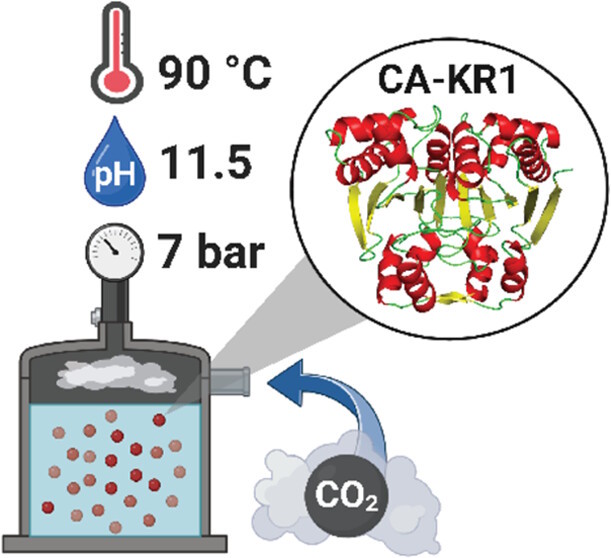Researchers from the Skretas Lab have discovered a robust enzyme for efficient CO₂ capture.
By scanning millions of genes from open-access metagenomic databases, scientists from the Skretas Lab, discovered the highly stable carbonic anhydrase, CA-KR1. This robust enzyme which specializes in enhancing the dissolution of CO₂ in water, exerts unprecedented stability under industrial conditions. The biochemical profile of the novel biocatalyst renders it a top candidate for implementation in green technologies that will allow the capture of CO₂ contained in industrial flue gasses, towards meeting carbon neutrality goals.
In more detail, CA-KR1 performs exceptionally well under conditions of Hot Potassium Carbonate capture technologies (HPC) with temperatures exceeding 80 °C and pH levels above 11. It enhances CO₂ capture productivity by 90% at 90 °C compared to standard non-enzymatic methods. CA-KR1 represents the most robust carbonic anhydrase reported to date for efficient CO₂ capture under HPC conditions. Thus, its integration in industrial settings holds great promise for accelerating the industrial implementation of biomimetic CO₂ capture – a green sustainable technology, expected to be a ‘game changer’ in carbon sequestration, significantly contributing to the timely achievement of carbon neutrality.
Publication: Rigkos, Konstantinos, et al. "Biomimetic CO₂ Capture Unlocked through Enzyme Mining: Discovery of a Highly Thermo-and Alkali-Stable Carbonic Anhydrase." Environmental Science & Technology (2024). https://doi.org/10.1021/acs.est.4c04291
